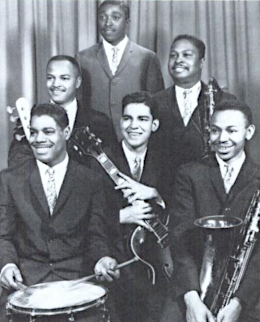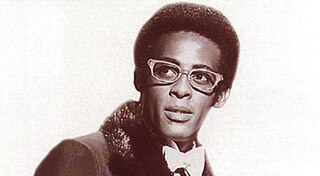
The Temptations are an American vocal group from Detroit, Michigan, who released a series of successful singles and albums with Motown Records during the 1960s to early 1970s. The group's work with producer Norman Whitfield, beginning with the Top 10 hit single "Cloud Nine" in October 1968, pioneered psychedelic soul, and was significant in the evolution of R&B and soul music. The band members are known for their choreography, distinct harmonies, and dress style. Having sold tens of millions of albums, the Temptations are among the most successful groups in popular music.
Motown is an American record label owned by the Universal Music Group. It was founded by Berry Gordy Jr. as Tamla Records on January 12, 1959, and incorporated as Motown Record Corporation on April 14, 1960. Its name, a portmanteau of motor and town, has become a nickname for Detroit, where the label was originally headquartered.

Berry Gordy III, known professionally as Berry Gordy Jr., is an American retired record executive, record producer, songwriter, film producer and television producer. He is best known as the founder of the Motown record label and its subsidiaries, which was the highest-earning African-American business for decades.

The Funk Brothers were a group of Detroit-based session musicians who performed the backing to most Motown recordings from 1959 until the company moved to Los Angeles in 1972.
Roquel "Billy" Davis, of Detroit, was an American songwriter, record producer, and singer. Davis was also known as a writer/producer of commercial jingles, mostly for Coca-Cola. He was also known as Tyran Carlo on writing credits.

David Ruffin was an American soul singer and musician most famous for his work as one of the lead singers of the Temptations (1964–1968) during the group's "Classic Five" period as it was later known. Ruffin was the lead voice on such famous songs as "My Girl" and "Ain't Too Proud to Beg."

"Ain't Too Proud to Beg" is a 1966 song and hit single by The Temptations for Motown Records' Gordy label, produced by Norman Whitfield and written by Whitfield and Edward Holland Jr. The song peaked at number 13 on the Billboard Pop Chart, and was a number-one hit on the Billboard R&B charts for eight non-consecutive weeks. The song's success, in the wake of the relative underperformance of the previous Temptations' single, "Get Ready", resulted in Norman Whitfield replacing Smokey Robinson, producer of "Get Ready", as The Temptations' main producer. In 2004 it finished number 94 in AFI's 100 Years...100 Songs poll thanks to its inclusion in The Big Chill soundtrack.

The Temptations is a four-hour television miniseries broadcast in two-hour halves on NBC, based upon the history of one of Motown's longest-lived acts, The Temptations. Executive produced by former Motown executive Suzanne de Passe, produced by Otis Williams and Temptations manager Shelley Berger, and based upon Williams’ Temptations autobiography, the miniseries was originally broadcast on November 1 and November 2, 1998. It was filmed on location in Pittsburgh, Pennsylvania, in the spring of 1998. Allan Arkush directed the miniseries.

United is a studio album by soul musicians Marvin Gaye and Tammi Terrell, released August 29, 1967 on the Motown-subsidiary label Tamla Records. Harvey Fuqua and Johnny Bristol produced all of the tracks on the album, with the exception of "You Got What It Takes" and "Oh How I'd Miss You". Fuqua and Bristol produced "Hold Me Oh My Darling" and "Two Can Have a Party" as Tammi Terrell solo tracks in 1965 and 1966, and had Gaye overdub his vocals to them in order to create duet versions of the songs.

The Soulful Moods of Marvin Gaye is the debut studio album by Marvin Gaye, released in 1961, and the second long-playing album (TM-221) released by Motown. The first was Hi... We're the Miracles (TM-220). It is most notable as the album that caused the first known struggle of Gaye's turbulent tenure with the label.

The Temptations in a Mellow Mood is a studio album by the Temptations, released in 1967 by Gordy Records. Composed primarily of pop standards such as "Ol' Man River" and "For Once in My Life", and similar songs written by Holland-Dozier-Holland and other Motown staff songwriters, the Mellow Mood album was part of Motown chief Berry Gordy's crossover plans for the group. Gordy wanted the Temptations, already the most popular male group among black audiences, to attract a large white fanbase and be able to secure playdates at supper clubs like the Copacabana, where the group had first performed in the summer of 1967.
"Try It Baby" is a slow blues ballad recorded by American soul singer Marvin Gaye, released on the Tamla label in 1964. The ballad was written and produced by Gaye's brother-in-law, Motown chairman Berry Gordy.
John William Bristol was an American musician, most famous as a songwriter and record producer for the Motown label in the late 1960s and early 1970s. He was a native of Morganton, North Carolina, about which he wrote an eponymous song. His composition "Love Me for a Reason" saw global success when covered by The Osmonds including a number 1 in the UK charts in 1974. His most famous solo recording was "Hang On in There Baby" recorded in 1974, which reached the Top Ten in the United States and number 3 in the United Kingdom. Both singles were in the UK top 5 simultaneously.
"Let Your Conscience Be Your Guide" is the debuting single for singer Marvin Gaye, released as Tamla 54041, in May 1961. It was also the first release off Gaye's debut album, The Soulful Moods of Marvin Gaye, in which most of the material was the singer's failed attempt at making an 'adult' record compared to Motown's younger R&B sound.
Gwen Fuqua was an American businesswoman, songwriter and composer, most notably writing hit songs such as "Lonely Teardrops", "All I Could Do Was Cry" and "Distant Lover". She acquired her full name after marrying Harvey Fuqua and kept the name after their divorce.
The Gordys are an African-American family of businesspeople and music industry executives. They were born to Georgia-reared parents Berry "Pops" Gordy Sr. and Bertha Gordy and raised in Detroit, where most of the siblings played a pivotal role in the international acceptance of rhythm and blues music as a crossover phenomenon in the 1960s. The accomplishment is attributable to the creation of Motown, a company founded by the seventh-oldest sibling, Berry Gordy Jr..
"All I Could Do Was Cry" is a doo-wop/rhythm and blues single recorded in 1960, and released in March that year by the singer Etta James. It was written for James by Chess songwriter Billy Davis, Berry Gordy and his sister Gwen Gordy. The song eventually peaked at number 2 on the US Billboard R&B chart and number 33 on the pop chart. James would later re-record the song in the early 1990s.
Freddie Gorman was an American musician and record producer, most famous as a singer, songwriter for the Motown label in the late 1960s and mid 1970s.

Harvey Fuqua was an American R&B singer, songwriter, record producer, and record label executive.
Anna Ruby Gaye was an American businesswoman, composer and songwriter. An elder sister of Motown founder Berry Gordy, she became a record executive in the mid-to-late 1950s distributing records released on Checker and Gone Records before forming the Anna label with Billy Davis and her sister Gwen Gordy Fuqua. Gordy later became known as a songwriter for several hits including the Originals' "Baby, I'm for Real", and at least two songs on Marvin Gaye's What's Going On album. The first wife of Gaye, their turbulent marriage later served as inspiration for Gaye's 15th studio album, Here, My Dear.









